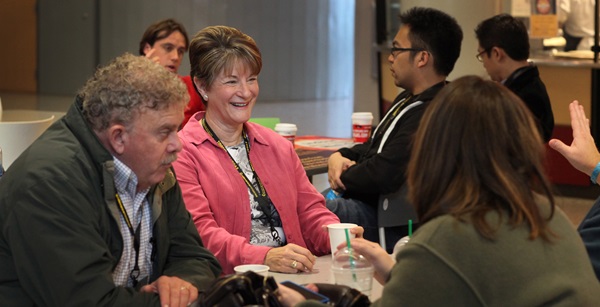This is the first in a series of 4 stories on Wesleyan small groups for today. Read the other stories here.

"I know what to do. I just have to do it." Discipleship growth, like staying healthy, only works when we put our knowledge into practice. Photo by Gabriel Santiago, courtesy of StockSnap.io.
For a time, I received periodic phone calls from the health-coaching program offered by my insurance provider. The cheerful people on the other end of the line were nutrition and exercise professionals who offered information and encouragement to help me stay healthy. As one call concluded, the coach that day asked if I had any questions. I replied, "No. I know what to do. I just have to do it."
That is as true for my life of discipleship as it is for my health. I know what I am supposed to do to grow spiritually, but without encouragement and accountability, I struggle.
John Wesley, founder of the Methodist movement, succinctly described the plan of discipleship in what he called The General Rules. As Christians, we are to (1) do no harm by avoiding evil of every kind; (2) do good to all people; and (3) attend upon all the ordinances of God like participating in worship, taking Communion, reading the Bible, praying, and more.
Unfortunately, knowing that does not always translate into living it.
The Apostle Paul understood the struggle. In Romans 7:15 he wrote, "I don't know what I'm doing, because I don't do what I want to do. Instead, I do the thing that I hate" (CEB). I get that! So did John Wesley.
Societies, Classes, and Bands - oh my!
The Methodist movement was not a church at the start. The early Methodists offered three types of groups to help Christians become better followers of Jesus. These were not to replace, but in addition to regular church attendance.
The Society Meeting was the largest of the three groups. Methodists would gather each week for instruction and preaching from John Wesley, Francis Asbury, or another early leader.
The Class Meeting was a small group of about a dozen people who shared life together. At their weekly meetings each member of the Class answered the question, "How is it with your soul?" Attendance in a Class was mandatory for admittance to a Society meeting.
The Band Meeting was a very small group of approximately 5 people who would confess their sins and struggles together. Members would talk specifically about their temptations, successes, and failures. Not every Methodist was part of a Band.
While trying to pay off a mortgage incurred when the Methodist movement purchased a building where they would hold Society meetings, Wesley and the other leaders came up with an ingenious plan. They divided the Society into "classes" of about 12 people each where one was designated the leader. The leader's job was to meet with each member weekly to collect a penny.
Wesley would later describe what the leaders learned during their visits. One member was "quarreling with his wife. Another was found in drink." Clearly, the early Methodists knew the General Rules, but were struggling to follow them.
"It immediately struck into Mr. Wesley's mind," Wesley wrote about himself, "This is the very thing we wanted. The leaders are the persons who may not only receive the contributions, but also watch over the souls of their brethren" (Wesley "Thoughts upon Methodism").
Soon, the Classes started meeting together to "watch over one another in love, that they may help each other to work out their salvation" (General Rules).
The weekly Class Meetings had a singular purpose. Each person was asked to answer this question, "How does your soul prosper?" Today, we might say, "How is your spiritual life?"
As people's lives were changed, the Class Meeting ministry model began to spread across England, and later across what would become the United States.
Disciples making disciples
Some United Methodist congregations and pastors have a renewed interest in these kinds of groups. Rather than devising strategies to grow congregation size, they are investing their time and energy into growing individuals into better disciples of Jesus Christ.
This helps United Methodist congregations live into the mission of our denomination: "To make disciples of Jesus Christ for the transformation of the world. Local churches provide the most significant arena through which disciple-making occurs."
It also aligns with what members have said matters most. In a 2014 survey, United Methodists named "creating disciples of Christ" as the most important issue facing the church today—ahead of all of the issues that get far more headlines.
Jesus gave the same charge to his disciples before ascending: "Therefore, go and make disciples of all nations… teaching them to obey everything that I've commanded you" (Matthew 28:19-20 CEB). This Great Commission is the call of every Christian, not just our pastors.
"Disciples of Jesus Christ are made today by disciples who have been loved and taught by other disciples," the Rev. Steven Manskar, Director of Wesleyan Leadership with Discipleship Ministries of The United Methodist Church teaches in a webinar. This is the method Jesus modeled and passed on, through Wesley and others, to us—disciples making disciples.
Each time we recite the Commendation and Welcome of our "Service for the Reception of New Members" (Baptismal Covenant I, section 16) we affirm this. "You, the members of the congregation are taking responsibility for each other, for the love and care of each other," Manskar said.
We should not delegate that role to our pastors alone. We can fulfill our vow to watch over one another in love through Wesleyan-styled small groups.
Transformed living
Discipleship: A Life Transformed
The goal of Christian discipleship is a transformed life. Wesley called this lifelong process sanctification or going on to perfection. The Book of Discipline describes our understanding:
Sanctification and Perfection—We hold that the wonder of God's acceptance and pardon does not end God's saving work, which continues to nurture our growth in grace. Through the power of the Holy Spirit, we are enabled to increase in the knowledge and love of God and in love for our neighbor.
New birth is the first step in this process of sanctification. Sanctifying grace draws us toward the gift of Christian perfection, which Wesley described as a heart "habitually filled with the love of God and neighbor" and as "having the mind of Christ and walking as he walked."
This gracious gift of God's power and love, the hope and expectation of the faithful, is neither warranted by our efforts nor limited by our frailties.
(The Book of Discipline of The United Methodist Church, 2012. paragraph 102)
Many churches have small groups, but as the Rev. Kevin Watson, United Methodist elder and Assistant Professor of Wesleyan and Methodist Studies at Candler School of Theology, writes in The Class Meeting: Reclaiming a Forgotten (and Essential) Small Group Experience, "Not all small groups are created equal! Some small groups are better than others."
Affinity groups are good for forming friendships, but not very effective for making disciples. They invite people to get together for an activity like sewing, jogging, motorcycle riding, playing cards, or daycare.
Information driven groups that bring people together to learn something are better. These include Sunday school classes, Bible studies, parenting classes, and the like.
The best small groups for forming disciples, according to Watson, are transformation driven. "I think the Class Meeting meets the need that every person has for meaningful connection and an appropriate place to be deeply known," Watson said in a recent interview. A transformation-driven group "pushes people outside of the comfort of an abstract, distanced discussion of ideas," he continued. "The Class Meeting is about knowing Jesus, being in Christ, and being in an active and transformative relationship with the Triune God."
If like me, Paul, and the early Methodists, your spiritual life would benefit from encouragement and accountability, consider joining a Wesleyan-style small group.
In this series of articles, we will explore ways churches and others are offering transformation-driven groups that watch over one another in love. Not all churches do it the same way because the goal is not a particular method, but rather "to make disciples of Jesus Christ for the transformation of the world."
Next we explore how some churches are adapting the Class Meeting for today.
Discipleship Ministries of The United Methodist Church helps local church, district, and conference leaders fulfill the shared dream of making world-changing disciples.
Editorial note: This story was first published August 10, 2015.
Joe Iovino works for UMC.org at United Methodist Communications. Contact him at [email protected].
Source:
Wesley, John. "Thoughts upon Methodism." The Works of John Wesley. Ed. Rupert Eric Davies. Vol. 9. Nashville: Abingdon, 1989. 527-30. Print.





